We’ve tested how well ChatGPT handles resumes and cover letters. But what about interviews? Specifically, is it smart to use it for interview advice? Can ChatGPT give you the insights you need to rock your next interview?
Maybe. We asked ChatGPT for advice on all kinds of interview topics, from answering specific questions to following up after the interview. And the results were hit or miss.
- Asking ChatGPT About Interview Basics
- ChatGPT’s Advice for Answering Interview Questions
- ChatGPT’s Advice for Answering Behavioral Interview Questions
- Advice Beyond Interview Questions
- ChatGPT’s Feedback for Interview Question Answers
- Where ChatGPT Went Wrong
- Using ChatGPT for Interview Advice: The Bottom Line
Asking ChatGPT About Interview Basics
We started with a basic question for ChatGPT: What interview advice do you have for me? Here’s what ChatGPT offered:
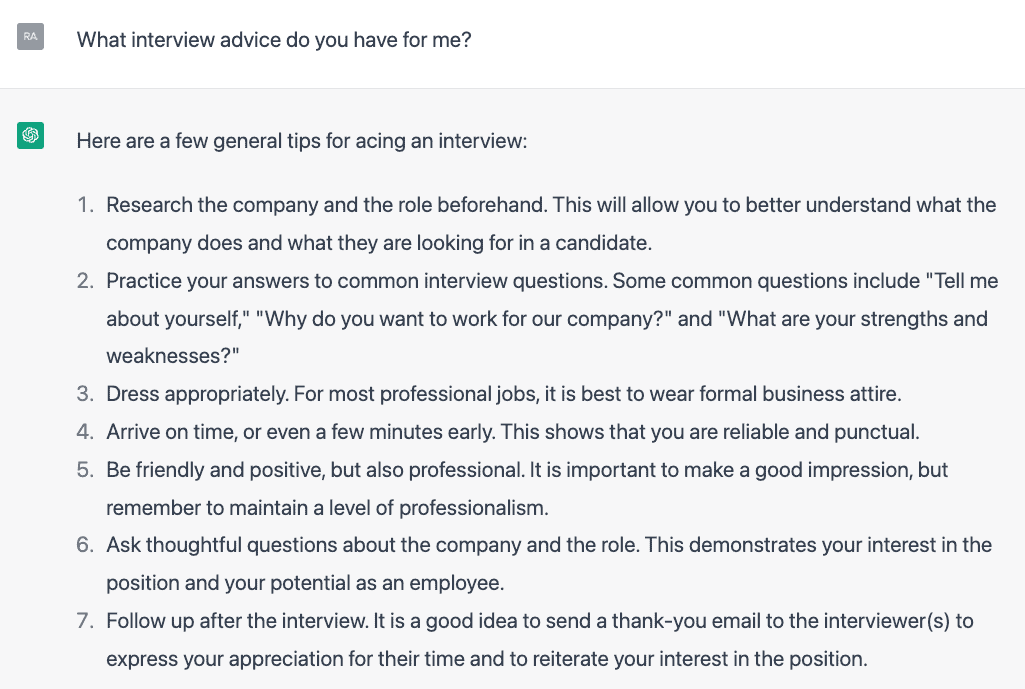
Generally speaking, the advice isn’t bad. It covers the basics, like the importance of researching the company and the role, and practicing answers to common interview questions. And while it seems obvious, sometimes advice like dressing appropriately, arriving on time, and being professional needs to be repeated.
But while the advice is decent, it’s just that — decent. Instead of including specific, actionable advice about preparing for an interview, ChatGPT gave very general advice. For example, one tip is, “It is best to wear formal business attire,” but it doesn’t explain what formal business attire is or why it’s the best choice for an interview.
ChatGPT’s Advice for Answering Interview Questions
When we asked for interview advice, ChatGPT included a few common interview questions to prepare for. But because we asked such a broad question, we got a broad answer (a common experience). So, we then asked for tips for answering specific interview questions.
When we asked ChatGPT how to answer, “Why do you want to work for our company?” the advice was OK. It gave some good tips, including highlighting your skills that align with the company’s needs and explaining what you find interesting or exciting about the company — all things you’d want to include in an answer.
>>MORE: How to Answer: ‘Why Are You Applying for This Position?’
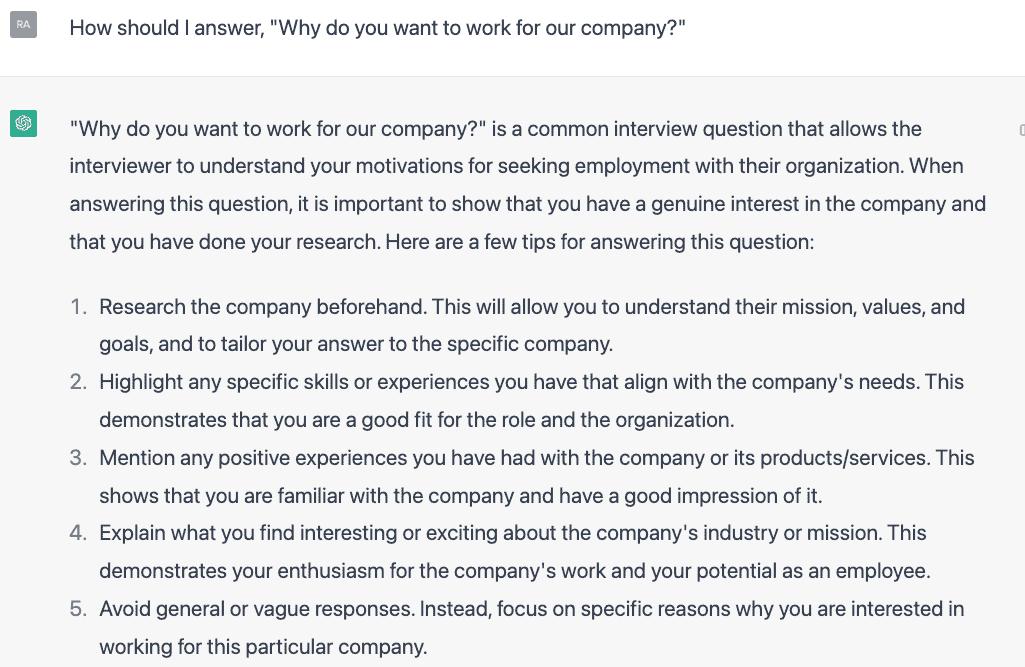
The same was generally true with other questions we asked ChatGPT about interview advice. Whether it was what questions to ask in a job interview or how to research a company and role before an interview, ChatGPT gave OK but general advice.
Then we moved on to the often-asked interview question, “Tell me about yourself.” Here’s what ChatGPT said:
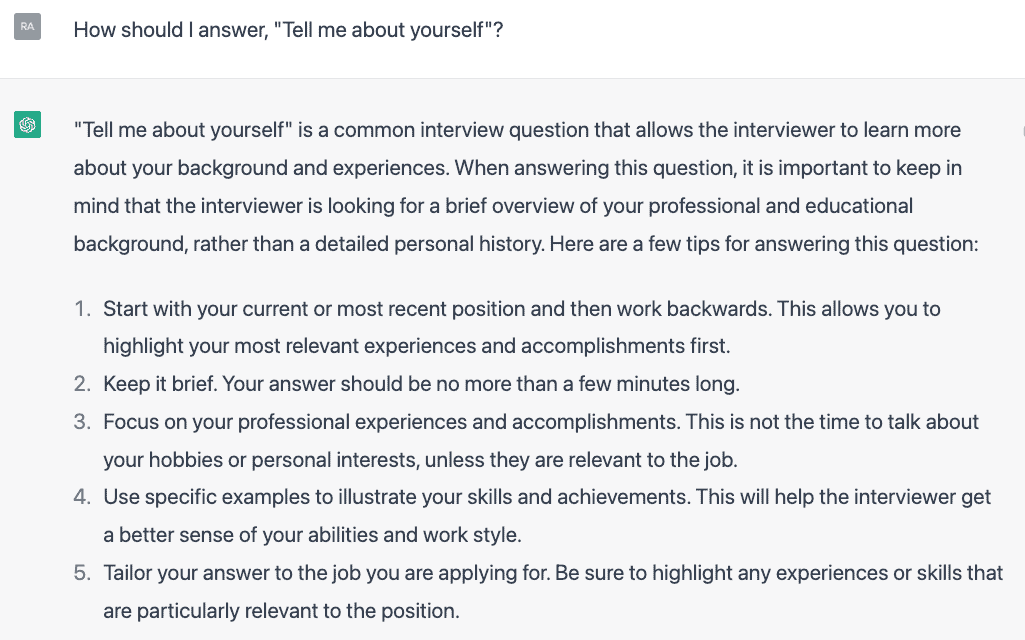
Some of the advice isn’t bad. ChatGPT nails it when it advises you to talk about the professional side of yourself, not the personal one. Ensuring your answer is brief and tailored to the job you’re interviewing for are also solid tips.
However, some of the advice isn’t as good. For example, it may not be the best idea to start with your current position and work backward or use specific examples to illustrate your achievements. While you can (and often should) include this information on your resume or during the interview, they aren’t the details you usually include when answering, “Tell me about yourself.”
>>MORE: How to Answer: ‘Tell Me About Yourself’
ChatGPT’s Advice for Answering Behavioral Interview Questions
It’s also common for interviewers to ask behavioral interview questions. These questions ask how you handle specific situations you might encounter on the job and help the hiring manager better understand your thought process. There’s no one “right way” to answer these questions, though using the STAR method can help you frame a response. We wondered what advice ChatGPT would have for answering these kinds of questions.
Mixed Results
The first question we asked was about answering, “Tell me about a time you broke the rules.” Here’s ChatGPT’s take:
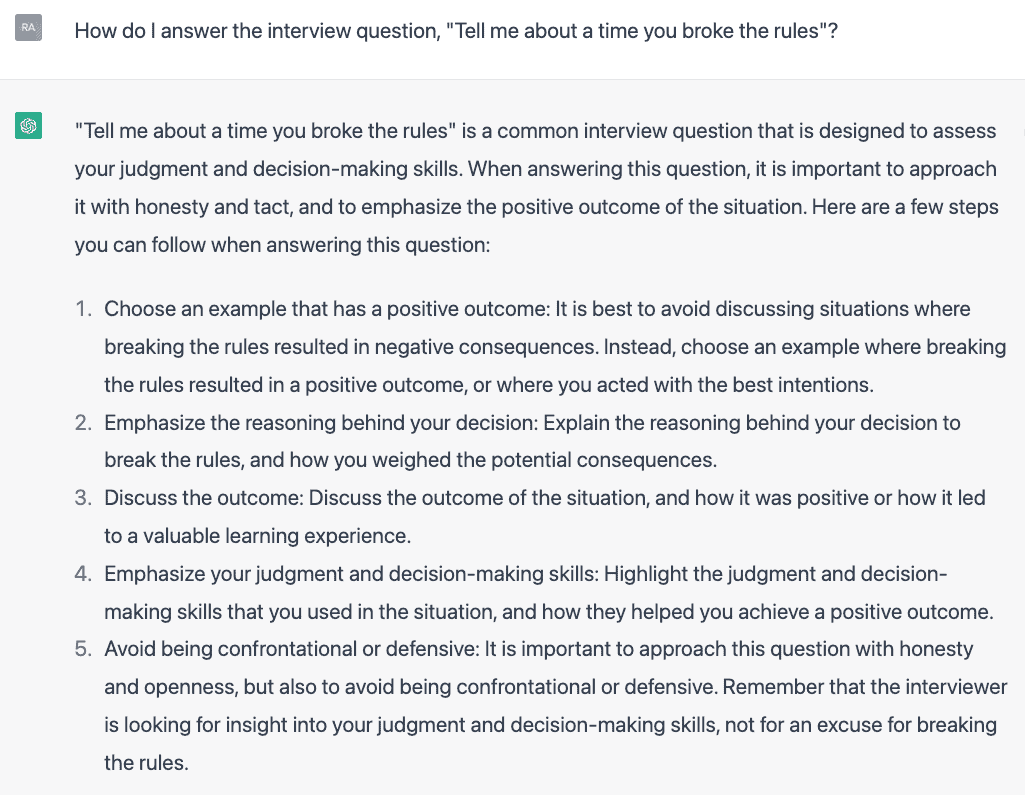
The tips are pretty good. It mentions how you should choose an example with a positive outcome and explain how it was positive or what you learned. It also describes what the interviewer is trying to understand (your judgment and decision-making skills). So, overall, it’s not a bad bit of advice.
Then we asked how to answer, “Tell me about a time you had to handle a conflict at work?” Here’s the answer:
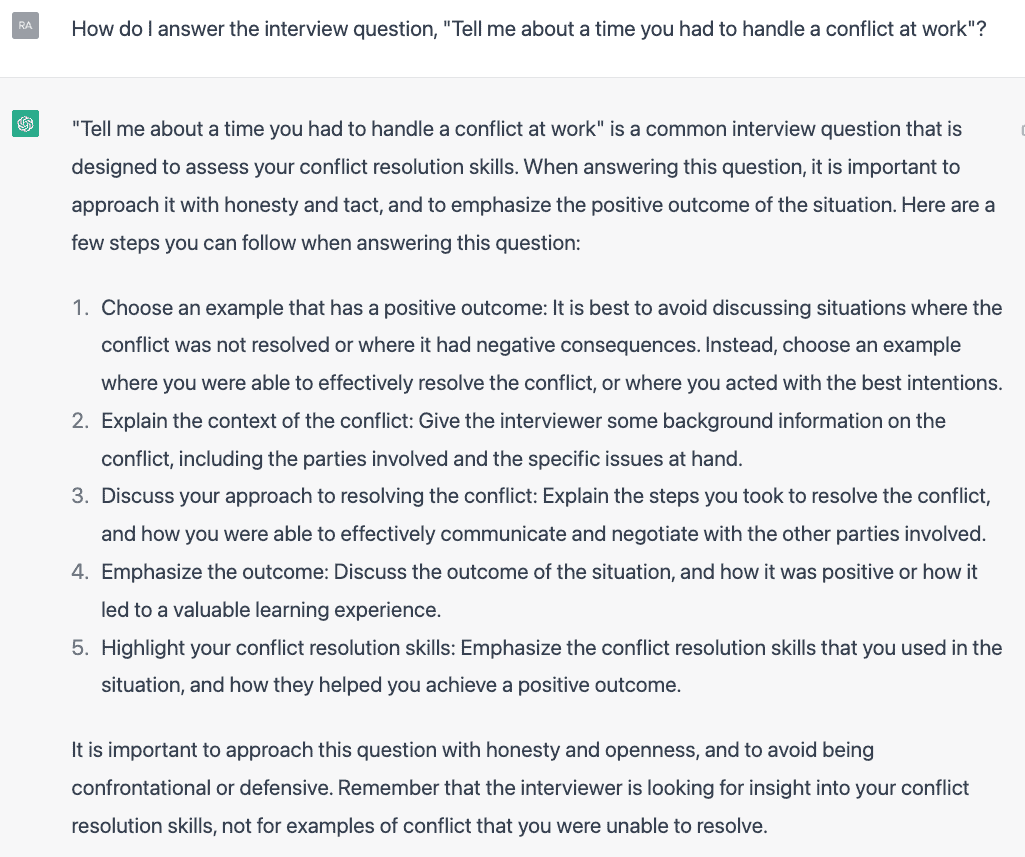
Sound familiar? While the advice is solid (choose something with a positive outcome and avoid being confrontational or defensive), it’s written using the same phrasing as the previous answer, only with a different situation swapped in.
The other thing that jumped out at us is that while ChatGPT says you should talk about your conflict resolution skills, it doesn’t give you any examples of conflict resolution skills. There’s no advice on highlighting your collaboration or active listening skills when discussing how you resolve conflicts in the workplace.
Advice Beyond Interview Questions
In addition to asking ChatGPT how to prepare for and answer interview questions, we also asked it how to handle things outside of interview questions that are part of the interview process. For example, we asked how long someone should wait before following up after a job interview:
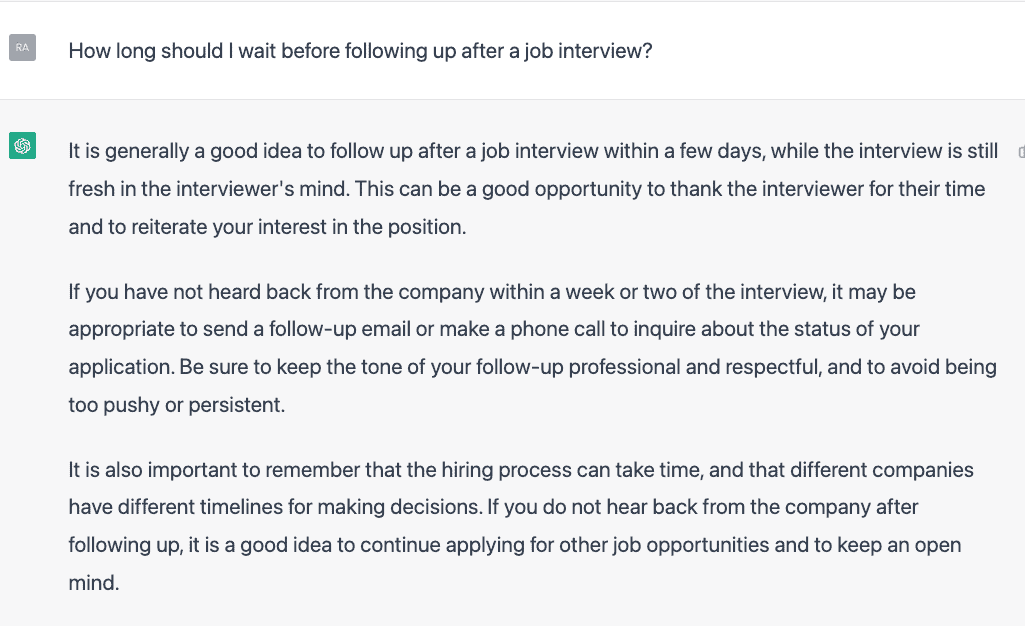
This time the advice was a bit muddled. There’s a difference between following up after a job interview and thanking an interviewer. While you can thank an interviewer when you’re following up, these are two distinct and different tasks. It seems ChatGPT conflated the two.
Also of note, it’s generally advised that job seekers wait at least a week or two before making the initial follow-up, not a few days. While there are exceptions to this (you got another job offer), following up within a few days can appear “too pushy or persistent,” something ChatGPT says you should avoid.
>>MORE: How to Write a Job Interview Thank You Email (With Template)
So, we asked ChatGPT the same question, but with a slight change to wording:
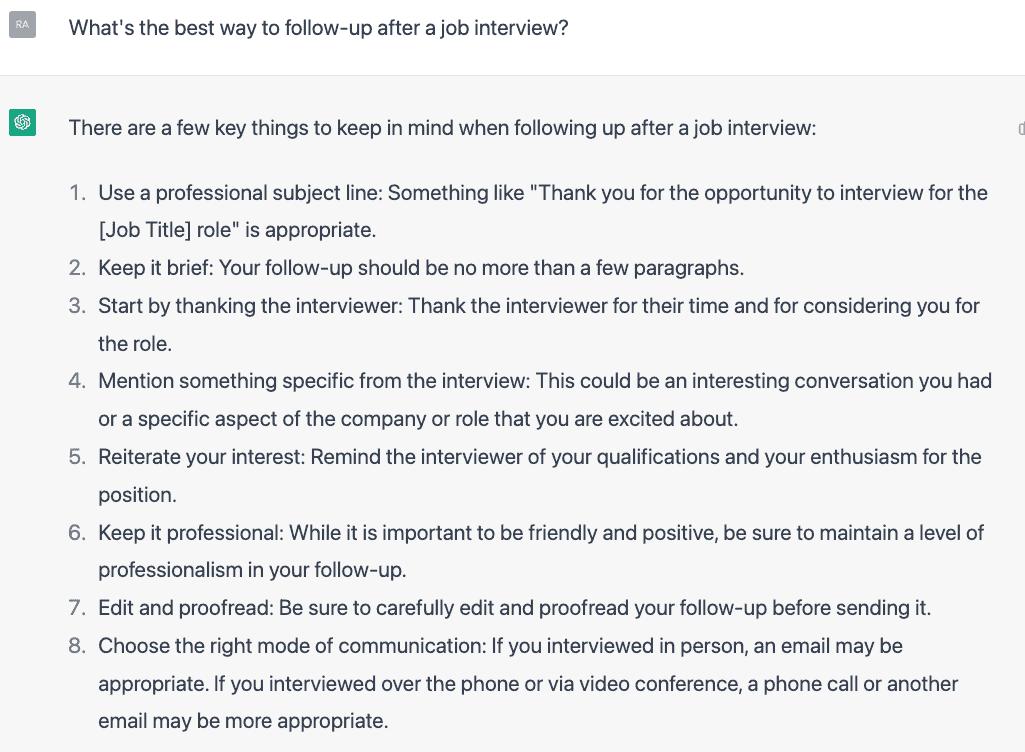
This answer was a bit better in that it included more actionable tips, such as mentioning some specifics from the interview and reiterating your interest in the role. What’s interesting about this response, though, is that the advice seems to contradict itself.
Point one advises you to use a professional subject line and then suggests what to use, and then points two through seven seem adapted to email follow-ups. However, point eight says that while email may be an appropriate method of following up, a phone call might be more appropriate. Again, this is true, but a little out of place given that all the other points are about following up via email.
ChatGPT’s Feedback for Interview Question Answers
You can also ask ChatGPT to evaluate your practice answers to interview questions. It’s almost like a mock interview, the main difference being it’s written instead of verbal. While not quite the same experience, being able to think through your answers and having a chance to edit them based on feedback can help you feel prepared and confident when meeting with an interviewer.
Here’s the first answer we asked it to evaluate:
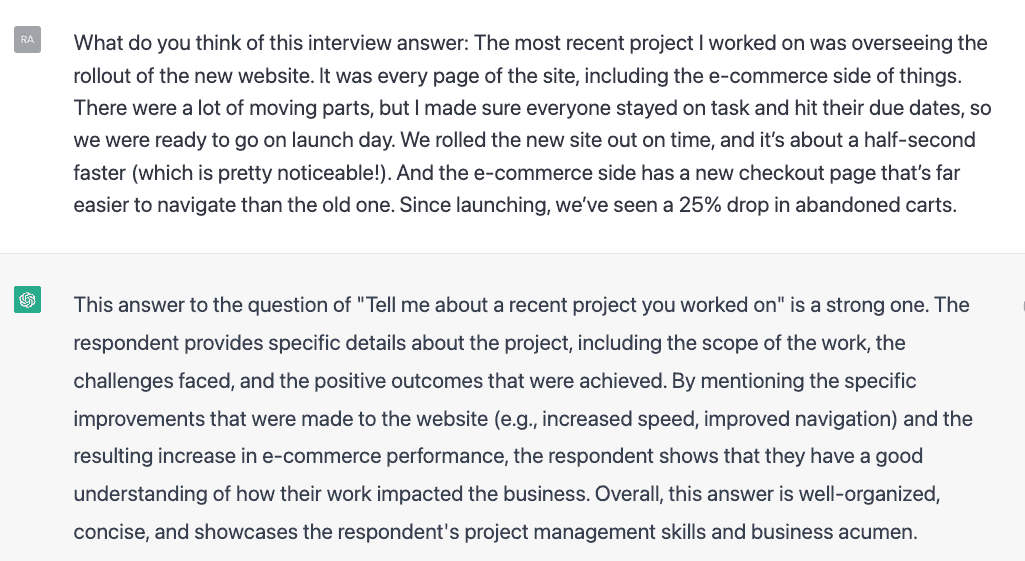
What’s interesting is we did not include the interview question, yet ChatGPT figured it out based solely on the answer!
And the feedback for this answer is very good. It points out what the answer does well (specific details, positive outcomes) and what it demonstrates about the respondent (a good understanding of how their work impacted the business).
ChatGPT was also very good at identifying when an answer wasn’t very strong:
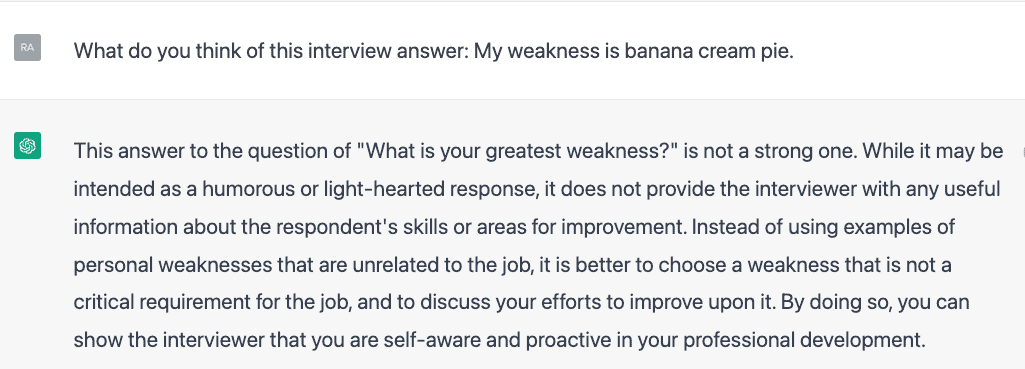
The analysis, though, is quite strong. It notes that while the answer is humorous, it isn’t very useful to the interviewer. ChatGPT also offers advice on how to come up with a better answer, like choosing a weakness that isn’t crucial to the role and describing what you’re doing to improve.
Where ChatGPT Went Wrong
For the most part, ChatGPT’s advice was OK but not outstanding. That’s likely because ChatGPT pulls responses from existing information. Some of that information is outstanding, and some of it isn’t. Depending on ChatGPT’s sources, you could end up with interview advice that is outdated or just plain wrong.
Wearing Formal Business Attire
One of the first pieces of interview advice from ChatGPT was that formal business attire is almost always the best choice for a job interview. So, we asked why ChatGPT feels that way:
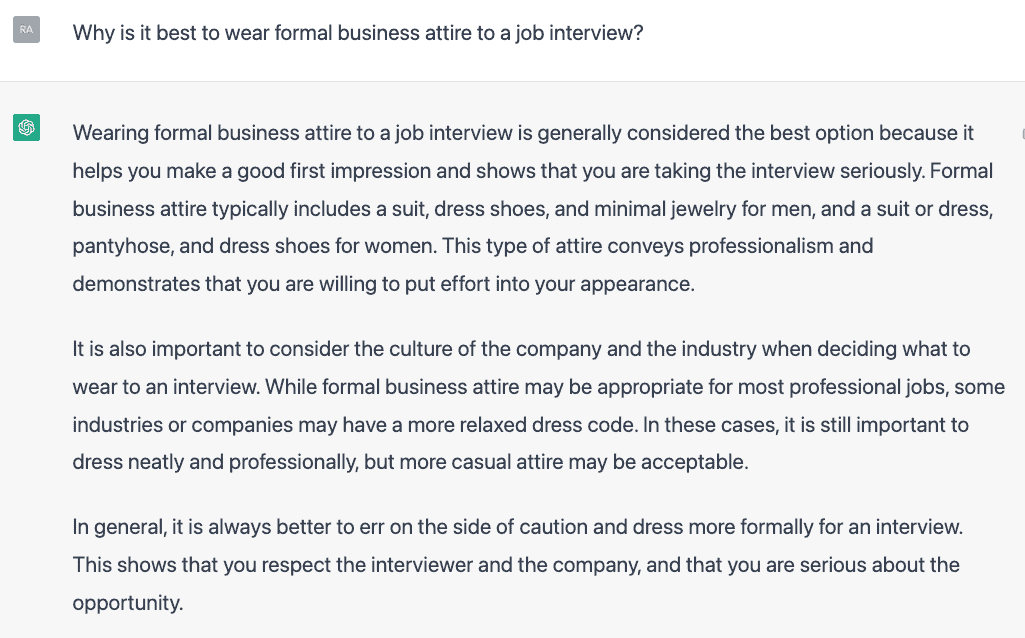
While we understand what ChatGPT is trying to say, it misses the mark. Most industries are more business casual these days, meaning that while you wouldn’t wear ripped jeans and a concert tee to your interview, you also don’t need to wear a suit. A business casual outfit is perfectly appropriate.
ChatGPT seems to take this into account, pointing out that you need to consider company culture and the industry when choosing what to wear to a job interview. However, a suit is not the only way to convey professionalism, that you “put effort” into your appearance, or to demonstrate you take the interview seriously.
Handling Salary Questions
One topic that often comes up in interview advice is salary. Should you ask about it, and if so, when? What should you say when an interviewer asks you about your salary expectations? Or what your current salary is?
So, we decided to get ChatGPT’s take on the topic. We started with a basic question:
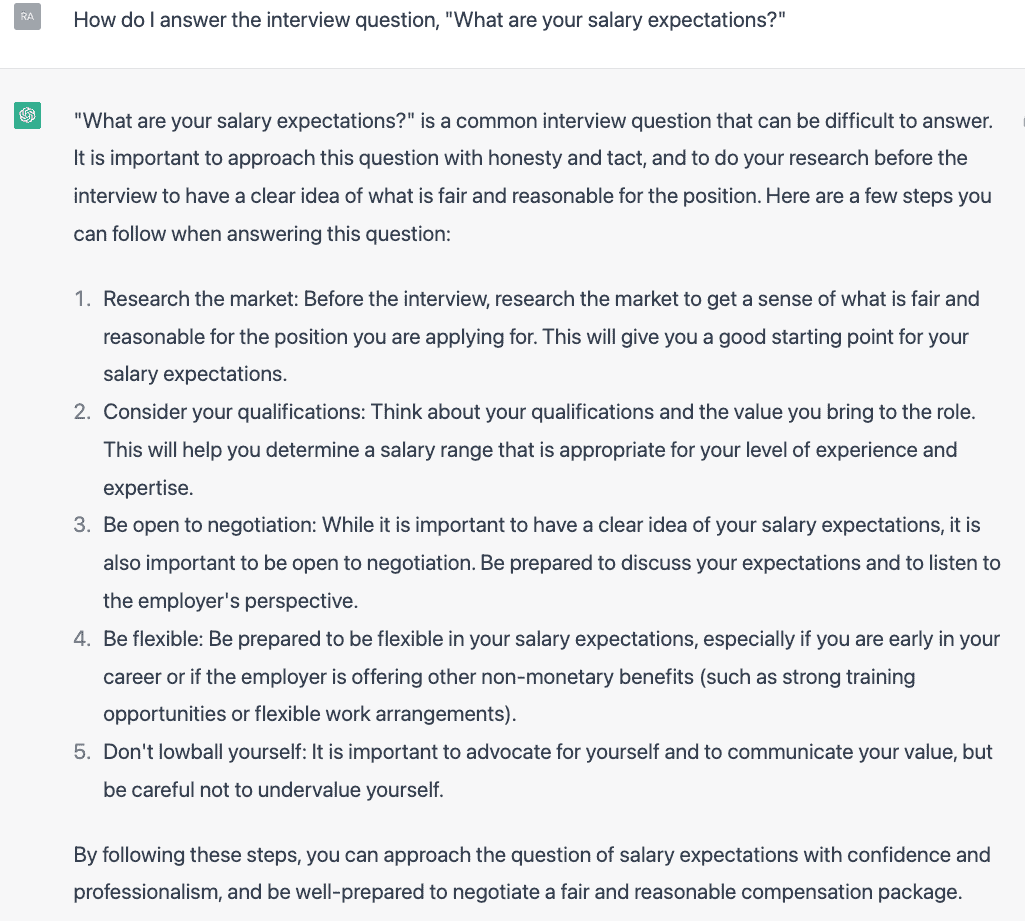
The advice is, once again, not bad but not great. One of the crucial tips ChatGPT misses is that, in many cases, it’s acceptable to respond with a question to the interviewer. You can ask, “What is budgeted for this role?” or, “What is the salary range for this role?” to avoid throwing out a number first. While this technique doesn’t always work, it can get the interviewer to tell you their pay range without revealing yours.
It’s also more geared toward salary negotiations rather than answering an interview question about salary expectations. While there’s nothing wrong with researching the market and being flexible, it’s highly unlikely you’ll need to negotiate your salary during a job interview — that usually happens after you receive a job offer.
Crush the interview
Forage’s virtual work experiences equip you with the skills and experience to speak confidently about the role during interviews.
Then we decided to give ChatGPT a harder question — specifically, what to do when the interviewer asks you what your current salary is:
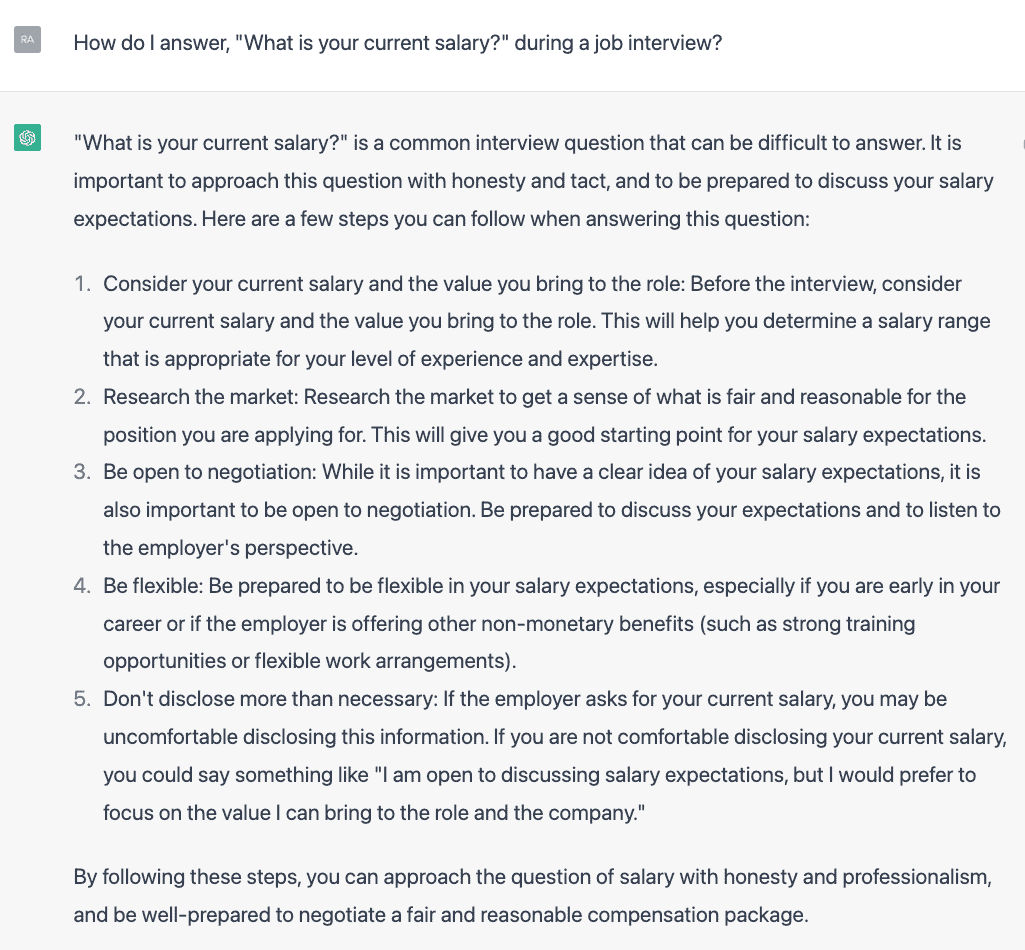
Again, the advice is OK but seems more geared toward actual salary negotiations than answering an interview question. What’s more, ChatGPT doesn’t give you any advice on answering the question without including a dollar amount until the last point. And a better answer would also include mentioning that salary is only one aspect you consider when weighing a job offer.
So, we tried again with slightly different wording of the same question:
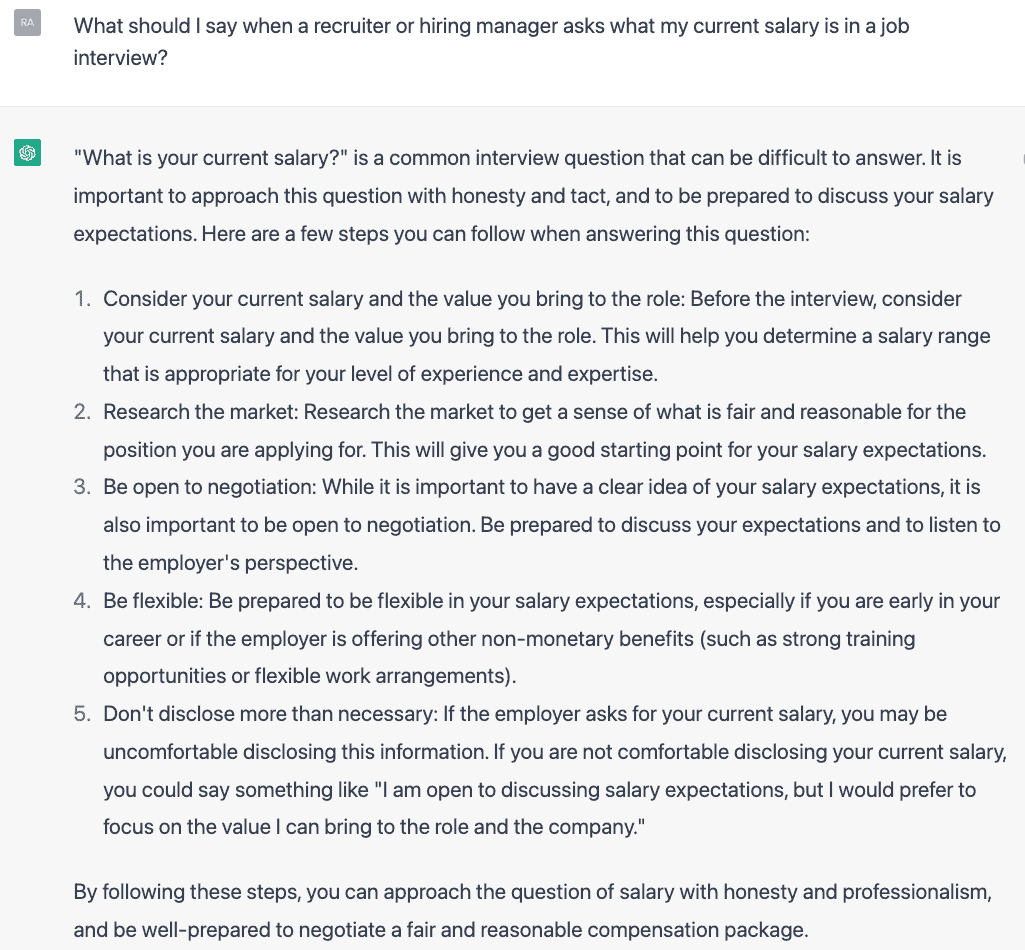
This time, we basically got the same answer. We tried again by hitting “regenerate answer” in hopes ChatGPT would learn from the first answer and create a better response. It didn’t. So, we tried yet again with a more direct question:
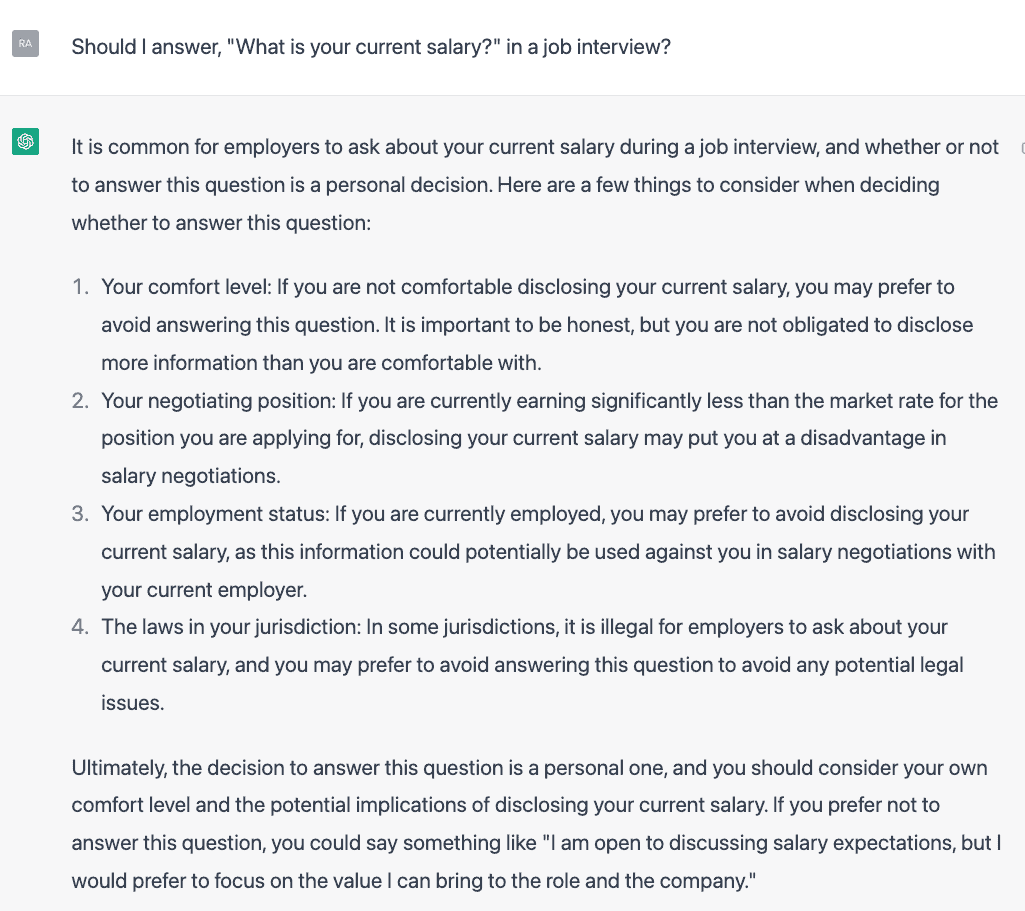
This time the answer was a bit different and slightly better. A major — and important — difference is that this answer points out that in some jurisdictions, it’s illegal for employers to ask you about your current salary, something ChatGPT didn’t mention in previous answers.
>>MORE: Should You Ask About Salary in an Interview?
Using ChatGPT for Interview Advice: The Bottom Line
ChatGPT is only as wise as existing information, and the company, OpenAI, even says that the AI can produce wrong answers, has limited knowledge of events after 2021, and is not connected to the internet. It’s also new and is open to the public for research and testing purposes, so the company can improve how ChatGPT functions in the future.
Overall, the interview advice generated by ChatGPT is hit or miss. Some is outstanding, and some is a bit misguided. Given that ChatGPT is still “learning,” it may not be the best place for interview advice. It might be OK to test some answers to specific interview questions, but in the end, you’re probably better off working with a knowledgeable career expert for now.
Ready to get started? Check out Forage’s interview prep page!
Image credit: Canva
